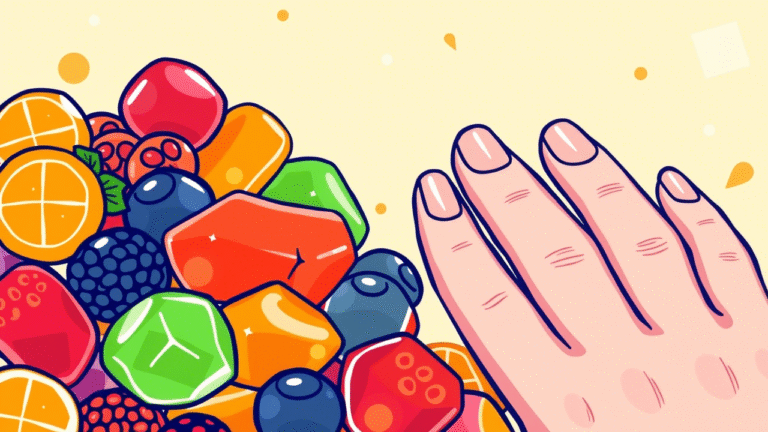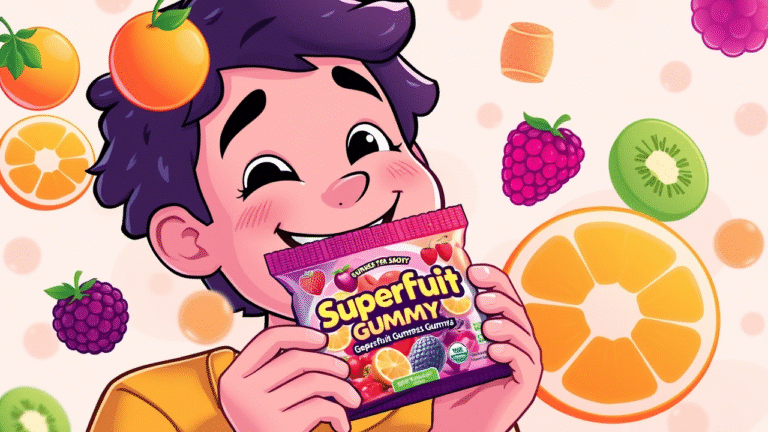Can Eating Gummies Really Help Your Hair Grow?
So, yes, eating hair growth gummies can improve your hair health, and they might even help it grow — especially if you’re deficient in some of the featured nutrients.
But they’re not a panacea for every type of hair loss. Read on to discover why this could be the snaking solution you’ve been seeking.
Why Should You Care About Hair Growth Gummies?
First, let me say this: I’ve been there. Looking in the bathroom mirror, gazing at my scalp, inquiring where all my hair had gone.
Sound familiar? Stress, bad diet habits, and plain old genetics—whatever the cause, thinning hair is a problem for so many of us. And believe me, when I first caught wind of hair growth gummies, I was doubting.
So do these little chewy candies actually work? Or are they the latest, overhyped wellness trend?
Here’s the catch: Your hair needs nutrients to thrive. If you’re falling short in your diet, gummies may give your body the extra punch it needs to have stronger, more vigorous hair.
But don’t expect a miracle, one that will cure everything overnight. Still curious? Let’s dive in.
What Does Science Say About Hair Growth Gummies?
Science doesn’t lie. There are studies that have favorable results. Here’s what scientists discovered when they tested these gummies.
Study #1: Placebo-Controlled Study
In one randomized, placebo-controlled trial, 65 women ages 18 to 60 with thinning hair tested a gummy supplement made with B vitamins, zinc and plant extracts. Here’s what happened after six months:
- Hair Density: There was a 10.1% increase in hair density for women who were taking the gummies. The placebo group? A 2% decrease. That’s a huge difference.
- Hair Strength: The strength increased by 10.2%, but it was not statistically significant compared to the placebo group.
- Participants also self-reported they had less hair loss, stronger hair, less breakage, and hair also appeared brighter (p<0.05). These self-assessments have consequences, because how we feel about our hair matters.
This report demonstrates how gummies can truly make a difference, particularly for those who are nutrient-compromised.
Study #2: Multivitamin Gummy Magic
- Another trial reviewed a multivitamin gummy product containing a formula of biotin, zinc, folic acid and amla. The results were mind-boggling:
- Growth Phase Hair Growth: An incredible 28.3% increase in Anagen to Telogen ratio. Translation? More hair remained in the growth phase instead of falling out.
- Hair Density and Diameter: Subjects saw a 15% density and thickness increase. To be able to run those fingers through fuller, thicker hair!
- Reduction of Hair Fall: Hair fall reduced by 74.7% ( with bulb ) and 75% ( without bulb ). That’s less hair in both your shower drain and brush.
- Gloss and Volume : Gloss of hair increased by 1.39 times, and full volume hair was achieved in 93.75% of the participants at the end of the study.
These are not only impressive figures — they are life-transforming for some.
Real-Life Stories
Clinical trials are wonderful, but what about actual people? And HUM Nutrition conducted a clinical trial, and the response was gushing:
- 94% reported stronger hair.
- 89% noticed faster growth.
- 91 percent said hairs felt shinier.
- 91% saw less shedding.
- After six months, 86 percent said their hair had been fuller.
These are not just statistics — they are the stories of individuals like you and me who desired better hair and sought to attain it through a daily gummy.
Yes, those are up for grabs, but these anecdotes offer hope.
I mean, think about it. If all-but-everyone is claiming their hair feels stronger, grows faster, and looks shinier, you have to wonder if there’s not a little something to it.
What’s Inside These Gummies Anyway?
So, what’s the secret recipe for these gummies? And they are rich in the nutrients that are critical for healthy hair. Here’s the breakdown:
Biotin
Biotin is frequently referred to as the “hair vitamin,” and for good reason. It encourages production of keratin, the protein that forms strong and healthy hair.
But it’s unlikely that you’re lacking in biotin. For most of us, extra biotin will be unlikely to do much other than possibly mask a deficiency.
Vitamins A, C, E
These vitamins combat oxidative stress that disrupts the hair follicles.
Vitamin A You need lots of vitamin A — and you’ll get it if you’re eating a healthy diet that includes good sources of vitamin A, such as vegetables, dairy, and fish.
These give you the oily scalp benefit: sebum and also moisturize your scalp. Vitamin C promotes the natural production of collagen, and Vitamin E defends skin from environmental aggressors.
Zinc and Folic Acid
Zinc also aids cell reproduction and repair, which is important for the growth of your hair. Your scalp is getting enough oxygen and nutrients.Folic acid makes red blood cells.
Botanicals
Some gummies contain plant-based ingredients such as amla (Indian gooseberry) or horsetail extract.
They include botanicals that impart antioxidant and anti-inflammatory properties to help keep hair from breaking.
The bottom line? These ingredients are most effective for those who have nutritional deficiencies.
These are the other bases your diet may already cover, in which case you might not find life-changing results.
Limitations
Before you get too excited, let’s discuss what gummies cannot do. They’re not miracle workers.
Not a Cure for Genetic Hair Loss
If hair loss runs in your family (such as male-pattern baldness or female-pattern thinning), gummies won’t reverse it. Minoxidil or finasteride are more appropriate options for these conditions.
Minimal Impact for Balanced Diets
If you eat a healthy diet with plenty of nutrients, gummies probably aren’t going to make much of a difference. Their benefits are greatest for people with deficiencies or poor diets.
Patience Required
Results take time. Most research suggests that improvements are seen after six months of consistent use. You won’t see miracles overnight.
Breaking Down the Numbers
For easy comparison of the data, here’s a table summarizing the findings:
| Study/Source | Hair Density | Hair Growth | Hair Strength | Hair Fall Reduction | User Satisfaction |
| Placebo-Controlled (n=65) | +10.1% | – | +10.2% | Self-reported ↓ | Improved |
| Multivitamin Gummy Study | +15% | +98.7% | +15% | -74.7% to -75% | 93.75% full volume |
| HUM Nutrition Trial | – | 89% faster | 94% stronger | 91% less shedding | 86–94% satisfied |
Table 1. This shows that you can expect some benefit from the gummies across the board. Whether it’s density, growth or user satisfaction, the evidence is overwhelming.
Who Should Try Hair Growth Gummies?
If you’ve been unsure whether gummies are for you, think of this:
- Do you have a poor diet? If you are skipping meals or not getting enough variety, gummies could supplement what you are missing.
- Are you shedding excessively? If you find yourself cleaning more and more hair out of your brush or the drain, the gummies may also help to cut down on that fallout.
- Do you want convenience? It’s more convenient to pop a sweet gummy every day than to choke down sour pills or make nutrient-rich meals.
That being said, if you feel like there may be an underlying medical problem (such as thyroid disorder or alopecia), check with a medical professional.
Gummies can help with hair health, but they’re not a cure-all.
Final Thoughts
Gummies for hair growth can make your hair denser, stronger, and generally healthier — if you use them regularly and stay sensible.
They’re not a silver bullet, but for many, they’re an easy, effective path toward healthier hair. Ready to give them a try?

I’m Kai, a fitness fiend and wellness geek from Vancouver. I love helping people find small, sustainable ways to feel better every day. From workouts, to good mental health, to smoothie recipes, I keep it real. Perfection is not my thing — progress is. When I’m not at the gym, I’m likely to be hiking or sampling a new meditation app







